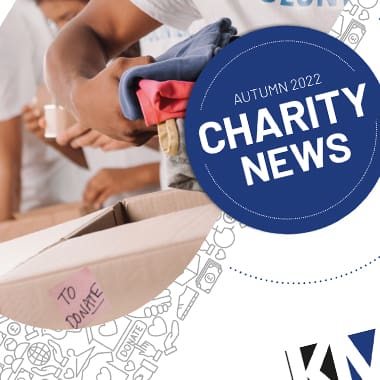Our latest charity newsletter is now available.
Category: Have you seen
KM Charity Newsletter – Spring 2023
Our latest charity newsletter is now available.
KM Charity Newsletter – Autumn 2022
Our latest charity newsletter is now available.
VAT Registration
VAT is a complex tax that is administered entirely by the taxpayer, the business. HMRC expect the business to know how to manage the tax and to operate reliefs, simplifications and apply all the complex VAT rules to comply.
Failure to do so will result in interest charges and penalties. Over the next few months some basic guidance on how to manage VAT will be provided, but this will be general guidance and it is the businesses’ responsibility to ensure that it applies to their particular situation. This month VAT registration will be examined.
Registration threshold
A business must register for VAT when their turnover exceeds the VAT registration threshold in the past 12 months, or you know you are going to exceed the threshold. This is currently £85,000. You must register for VAT if your taxable turnover exceeds the threshold in the last 12 months, or if you expect you will exceed the threshold in the next 30 days.
Points to bear in mind are as follows.
- Only taxable turnover is included, that is sales that are zero-rated, subject to VAT at the lower rate or subject to VAT at the standard rate, but does not include exempt sales.
- The 12-month period must be examined at the end of each month, not at the end of the financial year. If the business is nearing the threshold, you must monitor taxable supplies each month.
- The value to be included in the registration threshold calculation includes:
- goods hired or loaned to customers
- business goods used for personal purposes
- goods bartered or part exchanged
- services received from businesses outside the UK (items subject to the “reverse charge”)
- building work over £100,000 if the business did it for itself.
Exempt sales
It can be difficult to determine what sales are exempt from VAT. This is a complex area and professional advice must be sought if it is thought that exempt sales are made. Understanding exempt sales is important as you do not charge VAT on exempt sales, they do not count towards the registration threshold and no VAT on expenditure that relates to the exempt sale can be reclaimed. Examples of sales that can be exempt include:
- some property transactions (but not garage lets, parking fees, holiday or hotel accommodation or new sales of residential property)
- insurance
- betting and gaming
- credit transactions
- some education supplies
- some membership subscriptions
- some health services
- undertaker services.
VAT registration date
The date of VAT registration when the threshold was exceeded in the past 12 months is at the end of the month the turnover threshold was exceeded. The business has 30 days after the end of the month where the turnover has been exceeded to notify the need to register and the date of registration will be the first of the next month.
Example: JD Fabrics sells £20,000 of goods (all standard rated goods) each month and the business commenced on 1 January. Cumulative sales are:
January – £20,000
February – £40,000
March – £60,000
April – £80,000
May – £100,000
By the end of May, the threshold has been exceeded. HMRC needs to be notified of this by 30 June and the effective date of registration will be 1 July. From 1 July, VAT needs to be charged on all sales made, other than zero-rated sales and exempt sales. VAT incurred on expenses and goods purchased for resale can also be reclaimed.
Should you realise that the threshold will be exceeded in the next 30 days, you are required to register immediately. If, for example, you realise on 15 January you will exceed the threshold in the next 30 days, you must notify HMRC within 30 days, and you will be registered with effect from 15 January. VAT must be charged on all sales from 15 January. As you do not have a VAT registration number yet and are not yet actually registered you cannot issue a VAT invoice nor show VAT on an invoice. You can, however, charge an amount that includes the VAT that will be charged and issue a VAT invoice when the VAT number is issued to you to enable the customer to reclaim the VAT charged. For example, if the sale is £100 you will need to charge £120 including VAT. When the VAT number is issued you will issue a VAT invoice showing VAT of £20. Alternatively, you may initially issue an invoice for just £100 and later issue a VAT invoice for the extra £20 VAT.
Voluntary registration
A business can register for VAT even when its turnover is less than £85,000. This is advantageous where the business’s customers are also in business and can reclaim the VAT they are charged. Voluntary registration will allow the business to reclaim VAT on expenses and goods bought for resale. Although it has to charge VAT on its sales, its customers can reclaim the VAT charged. It is disadvantageous to voluntary register where the customers cannot reclaim VAT, usually where the customers are members of the public. This is because they cannot reclaim the VAT charged and the VAT is an extra cost increasing the sale price of goods sold or services supplied.
When do you not have to register?
Registration is compulsory if you exceed the threshold. There are, however, two exceptions. The first is where you make mainly zero-rated sales. It is necessary to contact HMRC and use the online registration process (or write to the registration service in Wolverhampton) to give the details of the supplies that the business makes. If HMRC does not agree that the majority of supplies made are zero-rated, you will be registered for VAT under the normal rules.
A second exception to VAT registration is where you believe the threshold is only going to be exceeded temporarily (for example you have an unusual one-off large sale). It is necessary to write to HMRC explaining that the threshold has been exceeded but you expect that future sales will not exceed the deregistration threshold in the next 12 months. The deregistration threshold is £2000 below the registration threshold and is currently £83,000.
Whilst this enables the price charged to the customer to be lower (as no VAT is charged on reduced rate or zero-rated sales), this is only advantageous where customers cannot reclaim VAT, as VAT on expenses cannot be reclaimed.
Claiming input tax
Input tax is the VAT incurred by the business on goods bought for resale or business expenses. This VAT can be reclaimed on the business’s VAT returns. The business can also reclaim VAT on a number of expenses incurred prior to registration. This includes any goods acquired in the previous four years if the business still has the goods (or where they have been used to make other goods that the business still has) or on services received in the previous six months. To reclaim the VAT incurred, it is necessary to have purchase VAT invoices that support the claim for input tax. In addition, the goods or services that were acquired before registration need to be included in a list giving a description of the items, the purchase date and a description of how they were used in the business.
Group registration
Where the business consists of more than one body corporate (that is companies or limited liability partnerships) they can register as a single VAT registration. This means that only one VAT return is submitted for all the group members and VAT is only charged on sales to non-group entities. VAT is not charged on sales within the VAT group. Should it be considered that a group would be advantageous further advice should be sought to ensure all the advantages and disadvantages are understood.
Transfers of Going Concerns
Where an existing and ongoing business is acquired, the acquisition will be treated as a transfer of a going concern. No VAT will be charged on the transfer of the business, but the person acquiring the business will need to register for VAT immediately. Where a business is not transferred but a collection of assets is acquired, VAT will be charged on the sale of the assets. The acquiring business will probably want to register for VAT to reclaim this VAT charged.
When there has been a transfer of a going concern, it is possible to transfer the existing VAT number. This seems helpful as it provides continuity but it is often not advisable as any VAT liabilities will also be transferred. It is usually recommended not to transfer the VAT registration number to ensure that the old business’s VAT liabilities are not transferred to the acquiring business.
KM Charity Newsletter – Spring 2022
Our latest charity newsletter is now available.
HMRC open over 1,000 new tax investigations every day
HMRC has launched 137,000 tax investigations in the six months to December 2021, according to tax investigation insurance firm PfP. This is up 9% from the 126,000 investigations in the same period last year. “This jump in tax investigations comes as the Government seeks to fill the black hole left in the public finances by the pandemic,” said Kevin Igoe, Managing Director at PfP. “Opening over 1.000 new tax investigations per day shows that HMRC has really picked up the pace.” He added, :”The Revenue clearly sees increased compliance activity as one way to balance the book.”
City AM
KM Newsletter – February 2022
Our latest newsletter is now available.
KM Newsletter – November 2021
Our latest newsletter is now available.
KM Newsletter – July 2021
Our latest newsletter is now available.
Self Employed – Have you claimed your SEISS correctly?
We are currently in the process of preparing tax returns to April 2021.
These have to include the Government grants you might have claimed as a separate entry and confirm if you made any errors in your claim. The guidance is here.
The most common errors will be if you claimed the self-employed grant but actually had started to trade via a limited company, or if your business didn’t suffer due to the Covid 19 virus. Take each grant application separately, it may be that you were eligible to claim the earlier grants, but circumstances have changed and your business was functioning well by the time the later grants came online.
If you now believe you should not have applied for one or more of the grants, let us know and we will advise you on the next steps.
Claiming Grant 5
If you are eligible to claim Grant 5 and your accounts aren’t made up to 31 March (or 5 April) you will have to adjust the figure to include your turnover for the tax year to 5 April 2021. Do not include any turnover for the period before 6 April 2020 and bring in turnover earned after your accounting year end to 5 April 2021. If 2020/21 was an exceptional year for reasons other than Covid, perhaps you had a baby, then you are allowed to use 2019/20 ‘s turnover as your reference period. The portal for Grant 5 will close on 30 September 2021. Remember you are only eligible if your reduced trade is due to Covid and you expect that to continue for the period May – September 2021.









